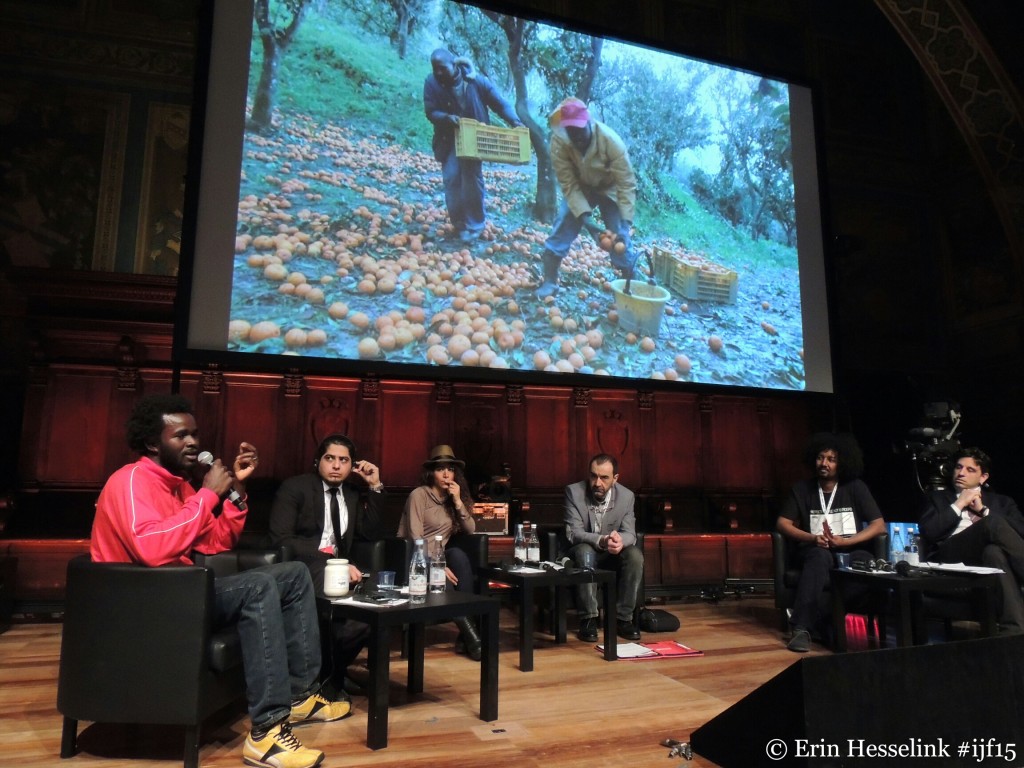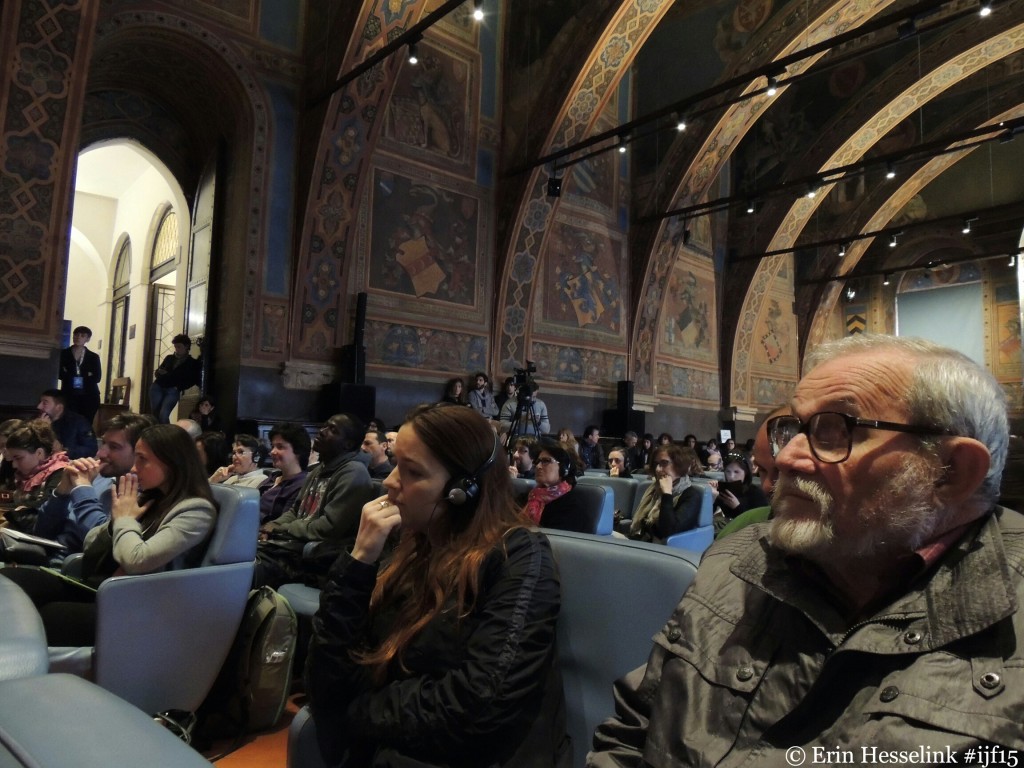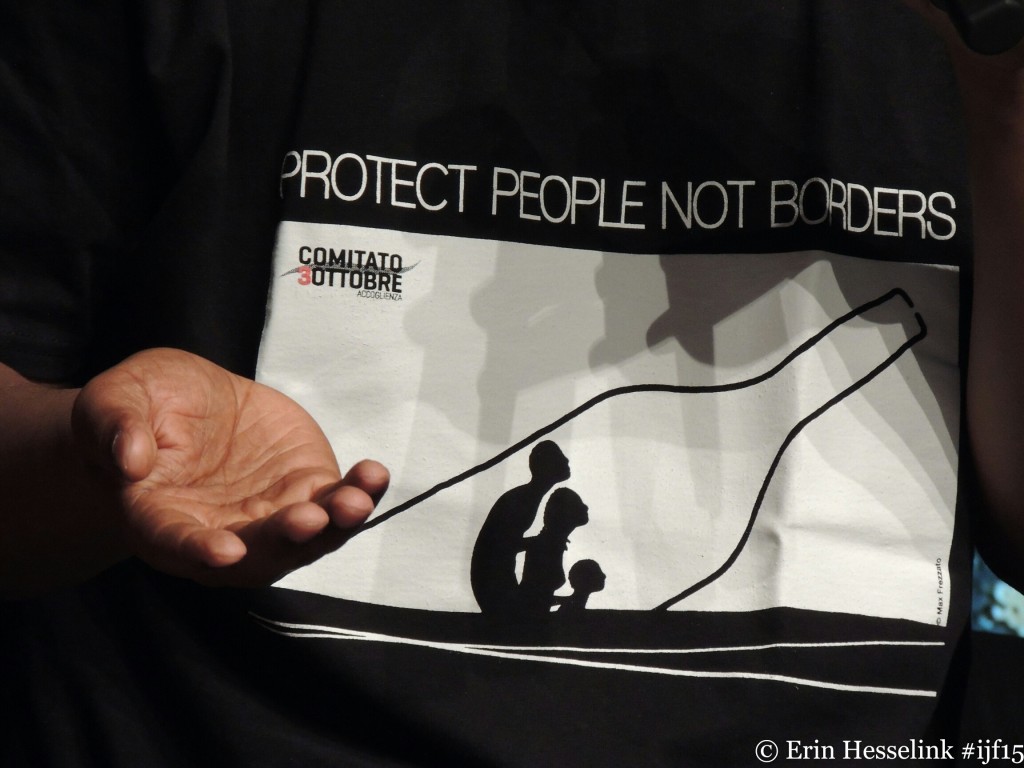
A minute of silence was held at the beginning of the panel discussion ‘The human faces of immigration’, in commemoration of the tragic event of April 19. Near the Libyan coasts, more than 800 hundred migrants lost their lives as they tried to flee to Europe.
The panel discussion was an opportunity to listen to the extraordinary stories of some asylum seekers and refugees, who explained how they found peace and a new home in Europe.
The event was moderated by the freelance journalist Luca Attanasio and saw the participation of Lucio Battistotti, head of the Representation of the European Commission in Italy; Michele Cercone, spokesperson for the former European Commissioner for Home Affairs Cecilia Malmström; Tareke Brhane, president of the 3 October Committee; Hooshmand Galati Soodabeh, asylum seeker; Aws Albayati, political refugee; and Suleman Diara, president of the social cooperative Barikamà.
Changing public perception
According to Attanasio, Europeans need to show more solidarity towards immigrants and immigration policies should be readjusted in order to be more open and welcoming.
To challenge wrong public perceptions and stereotypes, it is important to provide concrete facts and correct data. For instance, Attanasio recalled his visit to a secondary school: when he asked the students which country was hosting more political refugees, all the pupils replied ‘Italy’. According to recent statistics that Attanasio presented, however, the correct answer is Pakistan and Lebanon.

Fleeing from life threats
Building a new life in a foreign country is never easy, but sometimes this is the only chance that people have to survive. Aws Albayati is a 28-year-old Iraqi software engineer, who is now living in Belgium as a political refugee. Albayati was forced to leave his country after receiving death threats, because he was organising heavy metal rock concerts where they were also addressing critical political issues.
Albayati remembers well the day he came home and saw a bullet in an envelope, a typical way to threaten a person in Iraq. Without thinking twice, the young man grabbed all his valuables and went to Turkey, where he paid 12,000 dollars to a smuggler. He travelled to Belgium hidden in a truck inside a container, without seeing day light for eight days. When he arrived in Belgium, the immigration reception centres were full so he had to sleep rough for a while. It was only thanks to a friend that he managed to integrate into his new country and build a new life.
Economic migrants: from slave to yogurt-maker
Other migrants, like Suleman Diara, were not that lucky and had to fight hard for their rights. Suleman left Mali to find a better life in Europe. After travelling through Nigeria and Libya, he reached Siracusa, Italy. He was denied an official residence permit, so he went to work illegally in Rosarno.
The working conditions there were appalling: immigrants were forced to work as slaves, picking up ten crates of oranges for 20 euros a day in order to support their families back home. When clashes between local citizens and immigrants escalated into a shooting, people like Suleman could not stay there any longer.
Some of them went to Rome, where they slept rough at the train station until the social workers helped them find accommodation and gave them a temporary residence permit. Finding a job in Rome was difficult, so Suleman came up with an idea that could help him make a living: producing home-made yogurt and delivering it using a bicycle. He started using 15 litres of milk and now his small business uses 200 litres and is still expanding.
Political refugee: from Iraq to Italy barefoot
Hooshmand Galati Soodabeh was forced to flee Pakistan after she was repeatedly tortured by government forces. She wanted to find information about her husband, who was killed for his political ideas.
“All the parts of my body bear those memories,” she said.
The woman travelled through Greece, Croatia, Slovenia and then Italy barefoot. She was then found by a policeman, who took pity of her and her three-year-old daughter. Soodabeh was granted a political refugee status and she is now leading a normal life in Italy, where she works with children.

But do people really understand the tragic experiences immigrants have to go through?
Tareke Brhane was born in Eritrea, where he studied and worked from the age of ten to help his mother. At 17 he fled his country to avoid forced military conscription. Talking about his dramatic escape, he mentioned how his mother said goodbye to him, smiling and telling him to go alone because she couldn’t run with him.
His journey lasted five years. He faced death, violence and imprisonment while crossing Sudan and Libya. Some of the most shocking experiences include travelling on a jeep with 35 people inside. Among them there were also pregnant women and babies. He witnessed women being systematically raped and saw the desert covered with dead bodies.
Brhane believes nobody is interested in the countries asylum seekers come from and in the situations they are escaping from. The lack of a comprehensive immigration policy, according to Brhane, mainly depends on the fact that politicians are afraid to lose votes, as immigration is such a sensitive topic. This is why Brhane concluded the discussion pledging: “Protect people, not borders – borders are man-made. Imagine a woman who has been raped. What do we say to her? How many more victim are needed to shake your humanity?”